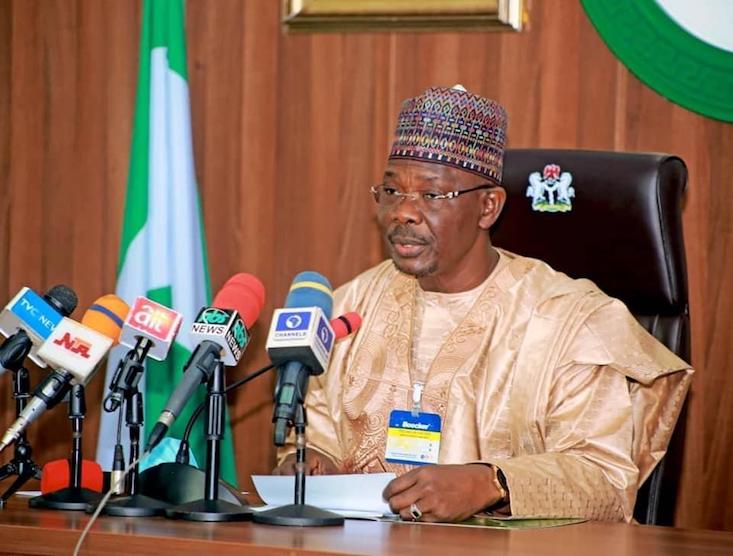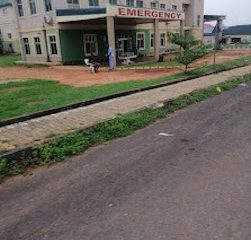NEWS
DOPF Urges Delta Assembly to Scrap Old Security Law
From Francis Sadhere, DeltaThe Delta Online Publishers Forum (DOPF) has called on the State House of Assembly to completely discard the existing community security law and replace it with a more functional and inclusive framework aimed at tackling growing insecurity at the grassroots level.In a detailed memorandum presented during a public hearing held at the Assembly Complex in Asaba, the Forum insisted that the previous law had failed in both purpose and execution, citing a lack of implementation mechanisms, vague operational structures and the exclusion of key stakeholders.
The public hearing was convened by the House Joint Committee on Bills and the Committee on Peace and Security, led by the Majority Leader, Hon. Emeka Nwaobi and Hon. Chief Isaac Anwuzia, respectively.Representing the Forum were its Vice Chairman, Chukwudi Abiandu, and member, Christy Agboje. They urged the lawmakers not to view the exercise as a mere amendment, but rather a “complete legislative rebirth” to address persistent security gaps across Delta’s communities.“The existing legislation is not only obsolete but also devoid of any real implementation framework,” Abiandu stated. “The new law must be grassroots-oriented, inclusive, and reflective of the unique security needs of Delta communities.”DOPF outlined key proposals for the new bill, including: Establishment of a clearly defined governance structure for the Community Security Corps, Creation of a dedicated media and communications unit, and Recruitment of personnel through local government authorities, Robust funding through statutory allocations and corporate partnerships, Inclusion of traditional rulers, civil society groups, women, youth, and media professionals in advisory roles at both state and local levels.The Forum recommended a phased implementation strategy, with the agency expected to be fully operational within 12 months of the law’s enactment. It also stressed the need for regular performance reviews, strong legislative oversight, and collaboration with the media to ensure transparency and efficiency.Commending the Assembly’s initiative to revisit the law, the Forum said the move was both timely and bold, especially as insecurity continues to escalate across rural communities in the state.DOPF reaffirmed its commitment to supporting legislative efforts and public sensitization campaigns, urging the lawmakers to ensure the new law aligns with human rights standards, local realities, and international best practices in community policing.The Forum’s advocacy for security reform is longstanding. It first raised the issue in a communiqué issued during its Audience Participatory Programme on November 12, 2020, themed “Aftermath of #EndSARS Protest: The Way Forward.” The push continued with a courtesy visit to the Speaker of the House on September 25, 2024, and was reinforced during its 5th Annual Lecture in November 2024, where local implementation strategies were emphasized.In a recent statement, DOPF also called on governors, particularly in the South, to prioritize security as a matter of strategic urgency, warning that the growing wave of insecurity was spreading rapidly across the region.As the Delta State House of Assembly considers the Forum’s proposals, all eyes are now on the legislature to chart a new course for grassroots security in the state.NEWS
Threat on Peter Obi Challenges Nigeria’s Unity, Democracy – Abaribe

By Eze Okechukwu Godson, Abuja
Former Senate Minority Leader, Senator Enyinnaya Abaribe has described the threat and restriction of movement placed on the former Governor of Anambra State, Peter Obi in Edo State by the Governor of Edo State, Senator Monday Okpebolo as a direct challenge to Nigeria’s Unity and a brazen attack on the constitution.
The lawmaker who is the Chairman of the South East Senate Caucus also warned that the Governor of Edo State lacks the constitutional powers to abridge any citizens’ right and may have by so doing, unconscionably triggered a divisive trajectory that could hurt Nigeria’s democratic advancement.
Abaribe in a statement released in Abuja on Wednesday by his Media Adviser, Uchenna Awom called for caution and warned that Nigeria is still a constitutional democracy where the rights of everyone, particularly citizens of Nigeria are guaranteed.
“It is therefore disheartening that leaders who are supposedly the custodians of the letters and spirit of the 1999 constitution as amended would decide to willfully be at the driving seat of its denigration in the name of politics.
“Nigeria is governed by rules and her leaders in all sub national governments subscribed to the adherence and respect to the rule of law as enshrined in the constitution.
“So one wonders where the Edo State governor derives his powers to bar a Nigerian citizen from visiting his State unless such a person obtains permission from him otherwise the person’s security will not be guaranteed.
That is a dangerous threat to life that the authorities should not gloss over.
“It is very unfortunate that it seems our dear country is fast descending to lawlessness with this mindset and I pray that nothing happens to Mr Peter Obi.
“Governor Okpebolo who was a Senator and as such a lawmaker needs to be reminded that Nigeria belongs to all of us and that he is dead wrong to claim authority that he does not have.
The beauty of democracy is made manifest in the expression of freedom to hold divergent views and the freedom of movement of every Nigerian in any part of the Nigerian Federation, Edo State inclusive”, Abaribe said.
NEWS
Police Arrest Bayelsa Judge’s Abductors

From Mike Tayese, Yenagoa
Abductors of a Judge of the Bayelsa State High Court, Justice Ebiyerin Omukoro, have been arrested by the state command of the Nigerian Police.
Justice Omukoro was kidnapped on June 21 in Yenagoa and was held for 12 days before he was rescued through the joint effort of security agencies in the state.
Governor Douye Diri disclosed the arrest on Wednesday during the state executive council meeting in Government House, Yenagoa, while honouring an officer, Superintendent of Police, Sentome Obi, who rejected a $17,000 bribe offered by a suspect involved in organ harvesting.
The Bayelsa governor, in a statement by his Chief Press Secretary, Daniel Alabrah, said everyone involved in the kidnap had been picked up by the police except the gang leader that was on the run.
He restated his warning to criminally-minded individuals to steer clear of Bayelsa, and stressed his administration’s commitment to its zero tolerance policy for crime and criminality.
He said the government had improved security architecture in the state with the acquisition of drones for the police to fight crime in addition to the installation of CCTV cameras in different parts of the state capital.
His words: “We have greatly improved our crime fighting efforts using technology. In the recent kidnap of a serving judge in the state, we were able to get him released unhurt.
“We summoned the security agencies and gave them the necessary logistics. At the end of the day, all those who committed the crime were apprehended except one that is still on the run. Bayelsa State has zero tolerance to crime and criminality.”
Diri commended the security agencies for their effort in ensuring that the state was safe and peaceful.
While honouring SP Obi, the Bayelsa governor praised his gallantry, honesty and devotion to duty.
He said the officer, who is an indigene of the state, brought dignity and pride to the Force and to Bayelsa.
He recommended Obi to the Inspector General of Police for promotion in recognition of his gallant effort in crime fighting.
On behalf of the state government, Governor Diri announced a reward of three-bedroom flat and a car as a mark of honour for his exemplary integrity.
He said at a time the Nigerian Police was grappling with image issues, Bayelsa had produced a police officer with commendable character and proved that a good name was better than riches.
According to him, “SP Obi did not only make the state proud, he also bolstered the image of the Nigerian Police and I urge other officers to emulate his shining example.”
In his remarks, the Bayelsa State Commissioner of Police, Mr. Francis Idu, congratulated the government and people of the state for producing one of the most dedicated and well-groomed officers in Obi.
The police chief stressed the need for government to invest more in boosting security towards the protection of lives and property.
NEWS
What’s Going on with Education in Nigeria?

By Dakuku Peterside
Walk into almost any public school in Nigeria, and you feel the weight of history pressing down on the desks. Much of the system still operates to the rhythm of colonial-era regulations and syllabuses, which were conceived for a world that no longer exists.
The design, the assumptions, the teaching style—all of it points backwards. Students memorise facts to pass exams, teachers rush to “complete the syllabus,” and education officials track school success by the number of children registered, not by what or how they learn. The result is a production line that manufactures certificates but struggles to produce thinkers, innovators, or adaptable workers.Across the country, you hear the same complaints from employers: graduates who struggle with writing, problem-solving, collaboration, or basic digital skills. The disconnect is no longer anecdotal—it’s structural. It is an indictment of decades of denial, neglect, and inertia.Despite the deep-rooted problems, there’s a sense of optimism in the air. The 2024/2025 school year didn’t just bring new speeches and slogans, but also new tools—something that has long been missing from Nigeria’s education reforms: reliable, accessible, and actionable data. Until now, education planning in Nigeria was akin to weather forecasting without satellites. Budgets were allocated based on guesswork, and staffing decisions were influenced by local politics and exigencies rather than the needs of students. Dropout rates, learning outcomes, and school performance were largely unknown. However, with the advent of data-driven reform, even the most well-meaning interventions now have the potential to deliver results.But the fog is lifting, and what we’re beginning to see is as sobering as it is transformative. In the pilot phase of the Nigeria Education Information Management System (NEIMS), a digital infrastructure that collects and stores schools and individual student records, data from 11 states showed that approximately 12 million children were enrolled in primary school. Yet by junior secondary school, that number had dropped to 1.76 million, and only 1.23 million made it to senior secondary school. Nearly 9 million children disappeared from the system between Primary school and JSS/SSS. For decades, these gaps were obscured in averages or attributed to vague notions of poverty or culture. NEIMS is making the crisis real, personal, and measurable.What was once a distant problem is now a national emergency, starkly depicted in charts and decimals. These numbers don’t just represent policy failure, but also individual dreams cut short. Every dropout is a lost opportunity, a potential health worker, teacher, engineer, artist, or entrepreneur denied a future they were never properly introduced to. Girls are forced out of the system due to early marriage, household chores, or distance from schools. Boys drift into informal jobs, street vending, or crime. And now, for the first time, we can see the dropout spike in real-time. The Nigeria Education Information Management System (NEIMS) has illuminated the extent of our past failures.At the heart of this shift is not just data for the sake of data, but a recognition that without evidence, reform is merely rhetoric. NEIMS, championed by the Minister for Education, Dr. Tunji Alausa, is Nigeria’s first serious attempt to build a nationwide, cloud-based, student-centred data system. Each child has a digital profile tracking their academic progress, behavioural records, attendance, health, and contact history. Teachers, school heads, ministry officials, parents, and even students themselves have role-based access to this information. This isn’t just a dashboard; it’s a lifeline for planning, equity, and accountability.Why does this matter so much? For the first time, we have education data across all levels of Nigeria’s education sector to support decision-making, policy analysis, planning , monitoring and management. Education planners can track precisely how many girls in Zamfara transitioned from Junior Secondary School 3 (JSS3) to Senior Secondary School 1 (SS1). School leaders in Bayelsa can identify precisely how many desks are missing before the next academic year. Because curriculum developers in Abuja can analyse where children consistently underperform and target support accordingly. Because parents can follow their children’s academic and behavioral growth, and teachers can tailor interventions for those at risk of falling behind. This is a quiet revolution—technical, yes, but also deeply human.Yet, as with any good data system, NEIMS is not just revealing problems. It’s also helping us ask better questions. For example, why are so few students choosing technical and vocational education (TVET)? In the same pilot data set, only about 63,000 students across the 11 states enrolled in technical colleges or vocational training centres, despite widespread demand for skills in construction, ICT, agriculture, and creative economy. This gap isn’t just an education issue — it’s a labour market crisis in slow motion. We are producing manygraduates who struggle to find employment, while employers face difficulties in finding skilled technicians, artisans, and service providers. It is a perfect storm of misalignment.Then there’s the curriculum itself. Even for those who stay in school, what they learn often bears little relation to what the economy requires. The national curriculum, rigid and outdated, still treats subjects such as entrepreneurship, coding, environmental literacy, and financial planning as optional or peripheral. The result is a generation of young people graduating with theoretical knowledge that does little to prepare them for modern jobs or civic life. We cannot discuss job creation or economic diversification without addressing this disconnect.Dr Alausa’s approach is not to overhaul the system overnight but to let data guide every step of change. His team is prioritising technical and vocational pathways as a legitimate and respected alternative for students who cannot — or choose not to — follow the traditional academic route. New funding and partnerships are being directed toward making TVET more accessible, aspirational, and aligned with industry needs. Online schooling is also being introduced for junior and senior secondary students, particularly in areas such as conflict zones, urban slums, coastal regions, and nomadic communities. By expanding access through technology, the system can reach children whom the traditional brick-and-mortar school model has long abandoned.While public schools dominate headlines, non-state schools (NSNs) — including faith-based, private, community, and home-school networks—teach an estimated 40 per cent of Nigerian children. Their growth has been explosive but uneven, with quality ranging from world-class to woeful. For years, they have operated in a grey area — serving a growing portion of the population but without consistent standards or oversight. The new National Policy on Non-State Schools (NPNSN) recognises their essential role, sets minimum standards for infrastructure, teacher qualification, and safety, and provides a regulatory framework to improve quality, safety, and collaboration. It also introduces a voucher system for out-of-school children enrolled in accredited non-state schools—a bold move toward inclusive financing. The message is clear: the government welcomes help but insists on rules.Meanwhile, reform is being localised and humanised through the Universal Basic Education, School-Based Management Committee and School Improvement Programme (SBMC-SIP). This initiative empowers communities to take real ownership of their schools by enabling them to manage small-scale infrastructure and accountability projects. Alongside this, the Teacher Professional Development (TPD) strategy seeks to rebuild the capacity of educators through new guides, peer mentoring, and a modular training rollout that supports the 2025/2026 curriculum shift. After all, no education system can rise above the quality of its teachers.By 2030, we should be able to log into NEIMS and see transition rates above 90 per cent in every state. We should see tripled enrolment in vocational education, gender parity in science classrooms, rising national assessment scores, and a decline in dropouts across every demographic. If the numbers stay stagnant, we will know that the momentum has been lost. That is the power — and discomfort — of real-time data: it holds us accountable to the children behind the statistics.For too long, Nigeria’s education debate has swung between despair and denial. The real task now is to occupy the hard but hopeful middle ground of stewardship — refusing to romanticise the past but also resisting cynicism about the future. That means rejecting the fantasy that reform will be easy — but also refusing the excuse that change is impossible. Stewardship means celebrating civil society tutors who coach girls after farm chores, critiquing budgets that underfund rural teacher housing, asking politicians for evidence rather than platitudes, and — above all — letting numbers guide our outrage and our hope. It means investing in data not as an end in itself but as a mirror that tells us who we are, and a compass that shows us where to go. It means elevating the voices of parents, teachers, and learners, not just policymakers. And it means asking more complex questions every year, not fewer.For the first time in a generation, the tools to do so are on the table. The servers are spinning, the dashboards are live, and the pilot data are whispering their truths. We are at a fragile but undeniable moment. What remains is collective resolve: from ministry war rooms in Abuja to chalk-dust-filled classrooms in Akwa Ibom, from software developers in Lagos to parent councils in Bauchi. If we listen to the data — and one another — we may yet turn Nigeria’s vast education deserts into fields of possibility, where every child’s potential is mapped, measured, and nurtured. If we choose to listen — carefully, consistently, courageously — then Nigeria may finally build an education system that doesn’t just enrol children but uplifts them. Not just a factory of certificates, but a ladder to opportunity. Not just a promise, but a plan. And this time, the plan is backed by numbers. The moment is fragile, but it is real. And it is ours to lose.Dakuku Peterside, a public sector turnaround expert, public policy analyst and leadership coach, is the author of the forthcoming book, “Leading in a Storm”, a book on crisis leadership.
















